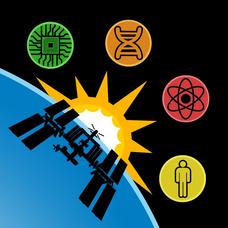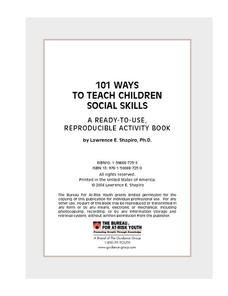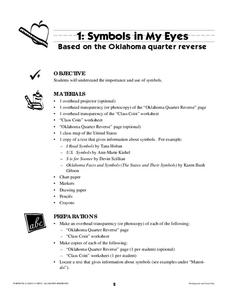Outside Education
Handmade Fettuccine
Young chefs engage in an interdisciplinary cooking lesson converting measurements within a recipe, crafting noodles, gathering herbs from the school garden, and making fettuccine for a class luncheon.
American Institute of Architects
Architecture: It's Elementary!—Fifth Grade
Young citizens construct an understanding of urban planning in this cross-curricular unit. Covering every aspect of city development from the political, economic, and social influences to sustainable building practices, this 10-lesson...
NASA
Space Station Research Explorer
Take a trip into outer space from the safety of your classroom. A great addition to the digital library of any science teacher, this reference offers a behind-the-scenes look at the research going at the International Space Station.
PBS
Blow the Roof Off!
Blow the minds of young scientists with this collection of inquiry-based investigations. Based on a series of eight videos, these "hands-on, minds-on" science lessons engage young learners in exploring a wide range of topics from making...
Broward County Public Schools
Force and Motion
Get the ball rolling with this upper-elementary science unit on forces and motion. Offering over three weeks of physical science lessons, this resource is a great way to engage the class in learning about simple machines, friction, the...
Curated OER
Plate Tectonics
Help young scientists piece together the theory of plate tectonics with this comprehensive collection of materials. Whether your are looking for worksheets, hands-on activities, or assessments, this resource has everything a science...
Guidance Group
101 Ways to Teach Children Social Skills
Increasing pressure to improve student achievement has made it easy to overlook the social skills they also need to develop. With this collection of worksheets and activities, you'll be able to improve children's communication, teamwork,...
National Wildlife Federation
The Water Cycle
Observe the water cycle from the comfort of your classroom with this excellent earth science experiment. Working collaboratively, young scientists first create terrariums complete with hills, plants, lakes, and an atmosphere,...
National Park Service
The Water Cycle Game
Take young scientists on a trip through the water cycle with this interactive science activity. After setting up a series of ten stations representing the different places water can be found, children use the included printable dice to...
Rain Bird Corporation
Rain Forest Teaching Curriculum
Take young naturalists on an exploration of the world's tropical rainforests with this extensive collection of lessons and activities. Whether its creating leaf and flower prints or investigating the absorption spectrum of chlorophyl,...
Signing Time Foundation
What is the Water Cycle?
Dive into an exploration of the water cycle cycle with this simple earth science lesson. After first discussing where rain comes from, young scientists define the terms condensation, evaporation, transpiration, and precipitation as a...
Science & Plants for Schools
Photosynthesis - A Survival Guide
Young scientists learn what it takes for life on Earth to survive with this series of photosynthesis resources. Offering twelve different activities ranging from independent practice worksheets to in depth scientific experiments, this...
UNESCO
The Water Cycle
Young scientists get their feet wet as they learn about the water cycle in this series of activities. Whether they are observing how evaporation causes puddles to dry up, or how plants put water into the atmosphere through transpiration,...
National Park Service
Living & Non-Living Interactions
What better way to learn about ecosystems than by getting outside and observing them first hand? Accompanying a field trip to a local park or outdoor space, this series of collaborative activities engages children in learning about the...
Santiago Canyon College
Taking Notes for Science Class
Provide young scholars with the tools they need to succeed with this reference on the Cornell note-taking strategy. By breaking the content of lessons into main ideas, supporting details, and overall summaries, students are able to...
Beth Kupper-Herr
Taking Notes
When you ask your students to take notes during class, do they really know what you mean? Are they taking the right kind of notes and using their time effectively? Make sure they are by offering this handout, a comprehensive guide and...
Montana Natural History Center
Studying Grassland Ecosystems
At first glance, grassland ecosystems might seem dull and uninteresting, but once you start to explore it's amazing the things you'll find! Through this series of engaging lessons, activities, and experiments, elementary students examine...
US Mint
Symbols in My Eyes
Explore the hidden meanings behind the images on US currency with this elementary school lesson on symbolism. Starting with a class discussion about symbols, children go on to brainstorm different objects that represent the Unites States...
Michigan State University
Gases Matter
Young scientists learn that seeing isn't necessarily believing when it comes to the states of matter. After performing a fun class demonstration that models the difference between solids, liquids, and gases, children complete a series of...
Andrews McMeel Publishing
POW! A Peanuts Collection
Make a study of Charles M. Scultz's famous comic strip Peanuts in your language arts class. Class members read and discuss the baseball-themed book POW! A Peanuts Collection. After talking about themes and vocabulary, they complete...
TED-Ed
Bringing a Pop-up Book to Life
Breath life into the pages of a text with this instructional video on creating pop-up books. From choosing a topic, through the planning and creation phases, this video examines how to develop engaging visual presentations that reach out...
All for KIDZ
Giraffes Can’t Dance Concepts: Giraffes Can't Dance
Teach young children that with a little perseverance and the help of a good friend, anything is possible. This two-part lesson series based on the book Giraffe's Can't Dance starts with a shared reading about Gerald and his attempts to...
Center for Civic Education
What Is Authority?
Young scholars examine the concepts of power and authority as they begin learning about government in this elementary social studies lesson. Through a series of readings, discussions, and problem solving activities, children learn about...
May Media Group
Treatment Plants
Young scientists explore nature's water treatment plants in this simple science demonstration. By placing a stalk of celery in a cup of water mixed with food coloring, children are able to observe how plants absorb nutrients and...

























